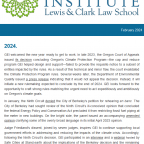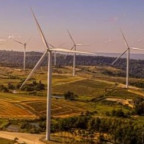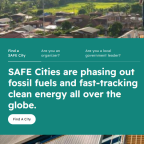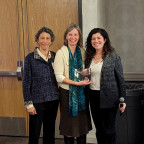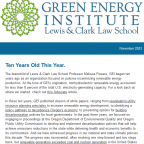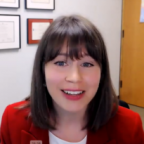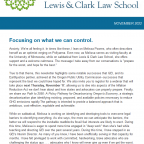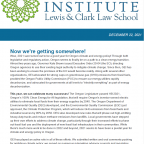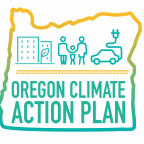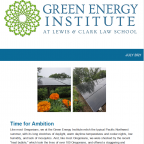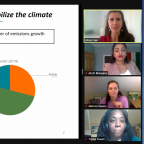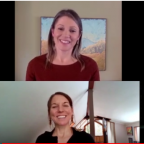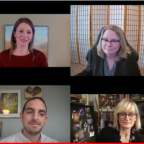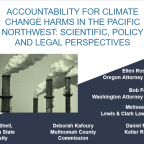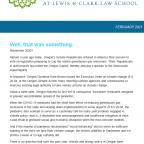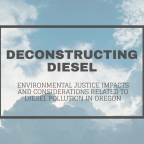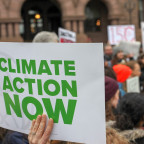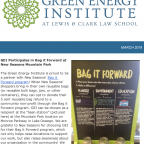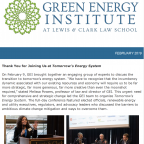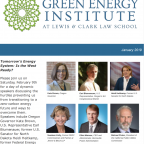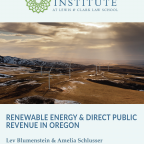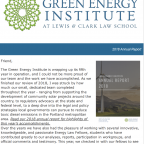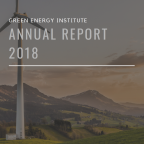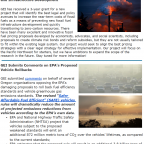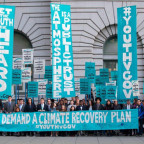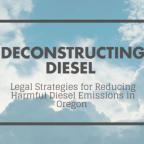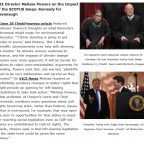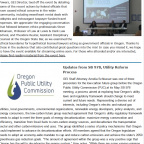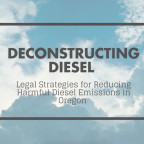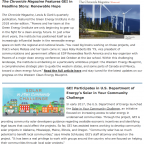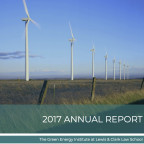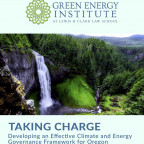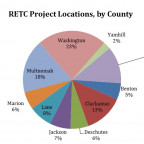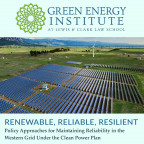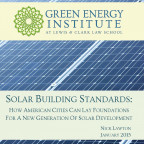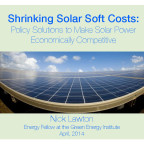GEI in the News!
GEI has been in the news this March.
GEI and Sierra Club File Amicus Briefs Arguing for Appealability of PUC Orders
GEI and Sierra Club join together to file two separate amicus briefs arguing that processes overseen by the Public Utility Commission end in final orders that are subject to appeal.
GEI Enters 2024 Ready to Work
Read about GEI’s work on HB 2021, wildfire liability, and post-California Restaurant Ass’n v. Berkeley pathways.
GEI Publishes Explanation of Public Utility Commission Order on HB 2021
Read a helpful explanation of the Public Utility Commission’s order concluding Oregon’s electricity decarbonization law does not require the retirement of renewable energy certificates.
GEI Director Carra Sahler is Interviewed: Ninth Circuit’s Berkeley decision leaves pathways open
Director and Staff Attorney Carra Sahler offered her thoughts about the effect on building decarb efforts after the Ninth Circuit’s decision invalidating Berkeley’s natural gas ban in buildings. Read the interview here.
Green Energy Institute Wins NW Energy Coalition Award
Lewis & Clark’s Green Energy Institute has been awarded the Bob Olsen Memorial Conservation Eagle Award by the NW Energy Coalition.
GEI Celebrates Ten Years and its Achievements
Read GEI’s Newsletter summarizing some of its work this year.
GEI Celebrates its Tenth Anniversary
GEI celebrated its Tenth Anniversary on Friday, September 15 by co-hosting Northwest Energy Opportunities: Transportation Electrification, Markets, and Career Paths for New Lawyers.
WATCH: The Legal Basis for Renewable Energy Certificates
Watch GEI’s staff attorney, Caroline Cilek, discuss the role RECs play with implementation of Oregon’s 100% Clean Energy for All legislation (HB 2021).
GEI in the News
GEI’s Interim Director and Staff Attorney, Carra Sahler, served as a resource on two climate-related Oregonian stories.
GEI and Breach Collective Publish Guide for Local Governments
NOTE: This Guide was published prior to the Ninth Circuit’s decision in California Restaurant Ass’n v. City of Berkeley, 65 F.4th 1045, 1048 (9th Cir. 2023), petition for reh’g en banc filed, No. 21-16278 (9th Cir. May 31, 2023). Many, but not all, of the pathways remain viable. Please contact us for further information.
GEI and Breach Collective published Regulating Natural Gas in Oregon’s Buildings: A Guide for Local Governments. The Guide offers ten strategies, and the legal feasibility of each, available to local governments in Oregon who seek to curb or prevent natural gas (methane) emissions.
Northwest Energy Opportunities: Transportation Electrification, Markets, and Career Paths for New Lawyers
Northwest Energy Opportunities: Transportation Electrification, Markets, and Career Paths for New Lawyers on September 15, 2023.
WATCH: Money, Money, Money: How Gas Utilities Could Chase IRA Dollars
To watch the one hour webinar, click here.
GEI Defeats Request to Raise Gas Bills
The Green Energy Institute (GEI) and Earthjustice celebrate victory while representing climate, environmental justice, and community-led social justice organizations in proceeding by Oregon regulators reviewing NW Natural’s request to raise gas bills.
The Path to 2050: A Policy Pathway for Decarbonizing Oregon’s Economy
While Oregon has made significant progress, the state is not on track to achieve its climate targets. GEI has developed an economy-wide climate policy roadmap for Oregon that identifies a suite of laws and policies that will enable the state to achieve its climate goals in an equitable and economical manner.
It includes key policies for reducing transportation sector emissions, reducing electricity sector emissions, building emissions, industrial sector emissions, and cross-sector emissions.
Drafted by Amy Schlusser and Caroline Cilek, the report “is intended to reflect a balanced climate policy approach that is ambitious, cost-effective, equitable, and achievable.”
To view the full suite of policies included in our decarbonization policy pathway, we encourage readers to explore our pathway within the EPS model. Energy Policy Solutions, GEI Oregon Decarbonization Policy Pathway,https://energypolicy.solutions/simulator/oregon/en?s=xjggfr3z. The link will launch the Oregon EPS and download the GEI pathway.
GEI is Taking on Fossil Gas
GEI Staff Attorney Carra Sahler partnered with Earthjustice attorneys to represent a coalition of environmental and community-based organizations who intervened to challenge NW Natural’s proposed general rate revision.
Professor Joins the Prestigious American College of Environmental Lawyers
Professor Melissa Powers is recognized by peers as preeminent in the field of environmental law.
Analysis of Oregon’s Constitutional Restrictions on Transportation Funding
With the transportation sector rapidly shifting to electric vehicles, pressure is increasing in many states to reduce reliance on gas tax revenues as the primary source of highway funding. This impetus is particularly pronounced in Oregon, where the state’s reliance on gas taxes conflicts with the state’s ambitious climate goals. Unfortunately, Oregon’s constitution constrains the state’s authority to raise and spend motor vehicle-related revenues. GEI’s Building Bridges report provides a comprehensive analysis of article IX, section 3a of the Oregon Constitution and the restrictions it places on raising and using highway funds. The report explains how Oregon’s constitutional restrictions limit available pathways to raise revenue to advance equitable transportation decarbonization and respond to shifting transportation needs in Oregon. The report also provides a detailed legal analysis of the Oregon Supreme Court’s interpretations of the constitutional restrictions on and permissible uses of highway funds.
Clean Water: Still Relevant at 50 — Webinar April 8
Legal experts and scholars discuss the impact–good and bad–of the CWA over five decades.
GEI Celebrates New Modeling Tool That Makes Evaluation of Climate Action Strategies Accessible to All
Thanks to the new Energy Policy Simulator (EPS) released by Energy Innovation, Oregon now has an incredibly useful modeling tool for policymakers to compare the outcomes and impacts from a wide variety of climate and energy policies. Try the tool here!
WATCH: Winds of Change: Offshore Wind, Fish, and the Western Grid
WATCH: When Offshore Wind Comes On Shore
WATCH: COP26: Outcomes for Climate Justice
To watch the one hour and fifteen minute presentation, click here.
WATCH: Capping Greenhouse Gas Emissions: Oregon’s Climate Protection Program
GEI Advises OR: How to Reduce Emissions and Help Communities
GEI Staff Attorney Amy Schlusser is one of 34 individuals advising the Oregon Department of Environmental Quality as it develops regulations to cap and reduce greenhouse gas emissions.
WATCH: Clean Energy Transition: Quitting Fossil Gas
WATCH: Climate Change Policies & Strategies: Where Do We Go From Here?
WATCH: Air Contaminants: Diesel, Woodsmoke, Wildfires, and Indirect Sources of Air Contamination
WATCH: Accountability for Climate Change Harms in the Pacific Northwest
February 2021 Newsletter
WATCH: GEI staff attorney discuss strategies to reduce diesel emissions at EQC meeting
GEI staff attorney appointed to Rulemaking Advisory Committee (RAC) to provide perspective on Oregon’s new program to reduce greenhouse gas emissions
GEI Authors Petition for Oregon Diesel Emissions Regulation
WATCH: GEI Staff Attorney on Diesel Pollution & Environmental Justice
Director Melissa Powers Op-Ed: Oregon Needs Executive Action on Climate Change
GEI in the News
GEI Publishes Deconstructing Diesel: A Law & Policy Roadmap
Deconstructing Diesel: A Law & Policy Roadmap
In the Portland metropolitan area, pollution from diesel-fueled vehicles and engines presents a significant risk to public health and causes temperature increases that contribute to global climate change. GEI’s Deconstructing Diesel Law & Policy Roadmap aims to help local governments and community stakeholders better understand the legal frameworks and regulatory limitations local governments must navigate to effectively address diesel pollution. The Roadmap presents a variety of strategies local governments can implement to reduce diesel pollution from on-road, nonroad, and indirect sources in Portland and surrounding Multnomah County.
Deconstructing Diesel Concise Guide Published
Deconstructing Diesel Concise Guide
March 2019 Newsletter
The Risks of Unlimited Banked Allowances in a Cap-and-Trade Program
February 2019 Newsletter
Successful PURPA Implementation in Oregon
Study Shows Millions Reaped From Renewable Energy Projects in Oregon
January 2019 Newsletter
Gov. Brown, Sen. Heitkamp, Congressman Blumenauer at Energy Transition Forum Feb 9
Renewable Energy Projects Have Generated More than $120 Million in Tax Revenues for Rural Oregon Counties in Past Four Years, GEI Study Finds
Renewable energy projects provided Oregon counties more than $120 million in direct tax revenue over the past four years and nearly $32 million in tax year 2017-2018 alone, according to our latest study, Renewable Energy & Direct Public Revenues in Oregon. Rural counties in Oregon were by far the greatest beneficiaries of this revenue: in the 2017-2018 tax year, Sherman County received more than $12.5 million, Gilliam County received more than $8.5 million, and Umatilla, Morrow, and Malheur Counties each received around $2.5 million in direct tax payments from renewable energy projects. Read the full report for more information.
Renewable Energy & Direct Public Revenue in Oregon
Renewable energy projects provided Oregon counties more than $120 million in direct tax revenue over the past four years and nearly $32 million in tax year 2017-2018 alone. Rural counties in Oregon were by far the greatest beneficiaries of this revenue: in the 2017-2018 tax year, Sherman County received more than $12.5 million, Gilliam County received more than $8.5 million, and Umatilla, Morrow, and Malheur Counties each received around $2.5 million in direct tax payments from renewable energy projects. Read GEI’s Renewable Energy & Direct Public Revenue in Oregon to learn more about the effects of renewable energy development in Oregon.
December 2018 Newsletter
Lewis & Clark Hires Professor Lisa Benjamin
Professor Benjamin is the newest member of the acclaimed Environmental, Natural Resources, and Energy Law Program and is a globally recognized expert and scholar in energy, climate change, and corporate law—particularly as they intersect.
November 2018 Newsletter
Powers speaks about Julianna vs. United States
October 2018
GEI Director Melissa Powers Online and on the Air Discusses the Administration’s Stance on Climate, Comprehensive Decarbonization Strategy, and Juliana v United States
Professor Melissa Powers weighs in on Trump’s plan to alter rule regulating emissions of mercury
September 2018
Deconstructing Diesel: A Diesel Reduction Roadmap for the Portland Metro Area
August 2018
July 2018
June 2018
May 2018
April 2018
Thank You to LC Giving Day Contributors; Deconstructing Diesel Happy Hour a Success; Welcome to Our New Deputy Director; Updates from the March Meeting of the Oregon Environmental Quality Commission; and Reforming Oregon’s Electricity Regulatory Framework Blog Post on Recent Oregon Public Utility Commission Meeting
Deconstructing Diesel event video footage
Deconstructing Diesel: Legal Strategies for Reducing Harmful Diesel Emissions in Oregon
New Certificate in Energy, Innovation, and Sustainability
March 2018
The Chronicle Magazine Features GEI in Headline Story: Renewable Hope; GEI Participates in U.S. Department of Energy’s Solar in Your Community Challenge; Deconstructing Diesel Happy Hour on March 21, 5:00-7:30 PM; and Charged Debate Blog Sheds Light on Renewables Regulation in the Trump Administration
Taking Charge: Developing an Effective Climate and Energy Governance Framework for Oregon
Oregon has ambitious climate goals that call for the state to dramatically reduce its greenhouse gas emissions by 2050, and the state legislature and executive branch agencies have adopted a variety of climate and energy-related policies that aim to reduce Oregon’s climate impacts and support the transition toward renewable energy. Despite these efforts, however, Oregon is not currently on track to meet its long-term climate goals. GEI’s Taking Charge analysis explains why a comprehensive climate and energy governance framework is necessary to achieve meaningful progress in decarbonizing state and local economies, and presents a series of governance options that would support Oregon’s efforts to reduce emissions and transition to a clean energy system.
Clean Energy Resources at Lewis & Clark Law Library
Oregon’s Solar Future
The Oregon Solar Plan
GEI analysis of Oregon’s RETC shows widespread benefits
Residential Energy Tax Credit Benefits Factsheet
Listen: Melissa Powers discusses Oregon’s efforts to reduce carbon
Letter From Director Melissa Powers
Countdown to 2050: Sharpening Oregon’s Climate Action Tools
A GEI policy report evaluating the effectiveness of Oregon’s existing climate laws and recommending that Oregon adopt a comprehensive climate policy framework to enable the state to reach its greenhouse gas emissions reduction goals.
GEI Releases Comprehensive Evaluation of Oregon’s Climate Policies
GEI Releases Report Presenting Strategies to Maintain Grid Reliability Under the Clean Power Plan
Renewable, Reliable, Resilient: Policy Approaches for Maintaining Reliability in the Western Grid Under the Clean Power Plan
A GEI policy report by Amelia Reiver Schlusser assessing the grid reliability implications of the Clean Power Plan in the West, and recommending strategies to support reliability under high penetrations of variable renewable energy.
Solar Building Standards: How American Cities Can Lay Foundations for a New Generation of Solar Development
The Green Energy Institute Releases Policy Report on Solar Building Standards
On January 28, the Green Energy Institute published a report, “Solar Building Standards: How American Cities Can Lay Foundations for a New Generation of Solar Development,” by staff attorney Nick Lawton. The report explains how solar building standards, which are local ordinances requiring solar power as a standard feature on new or renovated buildings, could offer significant benefits to many energy market stakeholders. Instead of relying on subsidies to entice investment from relatively affluent property owners, solar building standards would result in widespread solar development that keeps pace with construction and growing energy demand. At the same time, these new policies could lower costs of solar power, facilitate its integration into the energy grid, save property owners money, promote resilience to power outages, and allow utilities to develop business models that benefit from distributed solar arrays. The report describes the nation’s first two solar building standards, which were enacted in two California cities in 2013, and then offers design options that local governments should consider when adopting these policies. The report also explores possible arguments against solar building standards, which have dwindling merit as the economics of solar power continue to improve. The report concludes that as solar power’s costs of continue to decline and its benefits become increasingly clear, more local governments should give solar building standards strong consideration.
For more information on this report, please contact Nick Lawton at nicklawton@lclark.edu.
A Safe Bet: How Least-Risk Resource Planning Can Pave the Way for Renewable Energy
GEI’s blog has a new home!
100 Megawatts Per Day: Solar Power on the Rise
GEI Comments on Seventh Power Plan Methodology
GEI Comments on Hawaiian Distributed Generation Plans
New York’s REV: Modernizing the Distribution System
BLM Proposes Competitive Leasing Rule for Public Lands
If You Get Too Bright, I’ll Tax The Sun: Solar Rooftop Electricity Exchanges and Potential Income Tax Liability
A recent Information Letter Request filed by an Austin, Texas homeowner with the IRS could have far-reaching, unanticipated consequences for value of solar tariffs. This post investigates some of those potential ramifications.
Begging to Differ: Federal Courts Strike Down State Contract-for-Difference Schemes
GEI Submits Comments to Hawaii PUC Regarding HECO Company Plans
Part 6: Community Solar Mise-en-Place
Better Weather Forecasting Reduces Wind Integration Costs
Push and Pull: A Federal Tug of War over Renewable Energy
Part 5: Can Securities Exemptions Eliminate Community Solar Obstacles?
Bringing Utilities into the Sun: Measuring and Mitigating PV Impacts
Distributed Generation Rate Reform Around the U.S.
Part 4: State Community Solar Statutes
HECO Companies Propose Significant Charges for DG Customers
The Growing Economic Case for Renewable Energy
Exelon Wind v. Nelson: The Fifth Circuit’s Questionable Legal Analysis
The Fifth Circuit Eviscerated PURPA in Texas
Part 3: Virtual Net Metering
100% Renewable Cities
Three U.S. cities—Burlington, VT, Greensburg, KS, and Beaverton, OR— are proving that the transition to a 100% renewable power grid is achievable in the near term.
GEI Comments on Proposed Securities Exemption Rulemaking
Part 2: Existing Community Solar Models
A Review of a Trio of Federal Bills Promoting Renewable Energy on Federal Lands
Hawaii PUC Envisions Diminished Utility Ownership of Generation Facilities
A Call for Strong, Stable Renewable Energy Policy in the United States
Community Solar Introduction
The first in a four-part series on community solar, this post describes the basic elements of community solar. Later posts will describe existing community solar models, describe projects and obstacles in Oregon, and propose how Oregon can further incentivize community solar.
The Fulbright Begins
Professor Powers has received a Fulbright Scholarship to study renewable energy policy in Denmark and Spain. This opening blog post discusses the scholarship and her areas of study.


